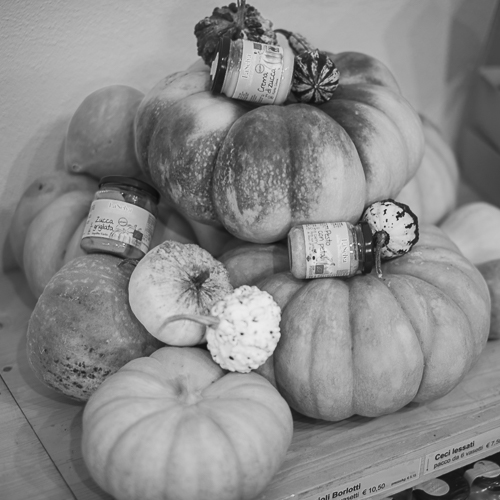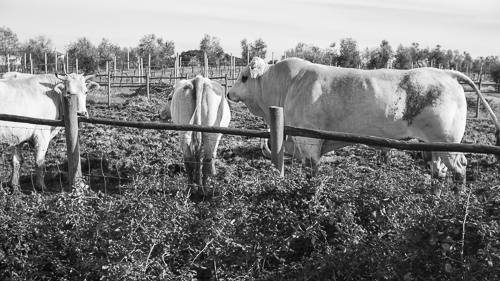
I had already visited this farm in March 2009, but being a big farm (about 829 hectares) where many activities are occurring continuously like animal husbandry, organic farming, food preservation, harvesting, sowing, cultivation and selling their finished products, makes it both necessary and worthwhile to return at various seasons in order to get a variety of impressions and getting to know the environmental philosophy of this farm.
Like it has always been, the philosophy of this farm is to collaborate with nature and not exploit it. This results in a rich life both in the soil and on its surface. Even though we can’t see the tiny creatures living in symbiosis with the plants, researchers have identified them by looking at them in microscopes. Anyway, not even soil researchers know much about them, but it’s certain that healthy soil gives healthy plants.
Like many farms practising organic cultivation, this farm also does crop rotation, meaning that they grow different types of crops on the same field like cereals and vegetables. and each cycle lasts 7-8 years. An example: alfalfa is grown 2-3 years in a row, but it’s harvested 2-3 times a year in order to to prevent the transition to flowering which would entail alfalfa seeds falling on the ground. Next, alfalfa may be replace by clover, which enriches the soil by means of nitrogen fixation.
Each cycle of cultivation include using green manure where the remnants of the plants are left to wither on a field so that they serve as a mulch and soil amendment. Moreover, it attenuates the washing out of nutrients from the soil due to heavy winter rains and it isolates the ground somewhat from temperature swings.
This farm raises Chianina cattle for their meat only. Hay mixed with manure from the animals is used as natural fertiliser for cereals whose hay is used as fodder for the animals and covering the ground where they live. The cows live in open air with roofs over their heads and the calves, of which the cows are very protective, stay together with their mothers for some months.
This farm is also using remnants from pruning and cuts from turning their agricultural produce into finished products as compost.
La Selva uses neither pesticides nor insecticides that make the plants vulnerable to attacks by insects like aphids, which can destroy all or parts of the harvest. Therefore, various techniques are being used in order to defend the plants against parasites and diseases. For instance, crop rotation and using compost make the plants less vulnerable to insects and diseases.
Moreover, working together with nature leads to that nature by itself makes the plants more resistant against insects and diseases. For instance, the aphids, which may cause huge damage to crops, may be eaten by predatory ladybirds, which my breed in large numbers if no insecticides are being used. Actually, La Selva is aiding useful insects like ladybirds and others to reproduce themselves. Some other ways of getting rid of aphids are described here.
In order to fight weeds, this farm uses various techniques like stale seedbeds, meaning that a field is prepared as if the farmer wants to cultivate some type of vegetables, but not sowing anything. Next, weeds will start growing in the field. Finally, they can be stopped by means of e.g. flame weeders, which will dry out the weeds or by mechanical means.
Other ways of working with nature include increasing biodiversity by creating and maintaining diverse habitats like leaving the land fallow, setting aside humid zones like ponds and marshes together with forests, amounting to 80 hectares in total.
La Selva also thinks about birds and how to improve their living conditions. Thus, by cooperating with local ornithologists, they have replanted native plants, bushes and trees, giving food and shelter to birds. They, in turn, hunt and eat insects like aphids, which eat the harvest. In addition, lots of birdhouses have been set up such that the birds can lay eggs in protected places. Moreover, by introducing ponds, which are habitats for amphibians and which can absorb a large amount of water in heavy rain and provide water for wildlife.
Piles of wood are left to rot in forests, giving habitat for various insects, while beekeeping ensures that the honeybees pollinate local flowers
The activities mentioned above have led to that the soil of the farm has become more fertile and the ample biodiversity has decreased insect attacks and diseases caused by fungi.
Animal welfare is very important for La Selva and great emphasis is placed on keeping the animals healthy and avoiding that they are stressed or frightened. Sooner or later, the animals are slaughtered, but their lives should be as good as possible before that.
This farm uses solar cells in order to reduce consumption of electrical energy from the grid.
Water at low pressure and irrigation by means of water droplets are used to water the plants. The soil, which has been irrigated, is covered by a biodegradable cloth to reduce evaporation.
Water, which is taken from a well, is filtered, decalcified and exposed to ultraviolet light in order to finish off harmful bacteria and viruses. In addition, water, which has been used for irrigation, is cleaned by means of phytoremediation.
Last but not least: the workers are treated well. All in all, this should mean that La Selva lives up to the motto of Slow Food: good, clean and fair.
An article about ladybirds can be found here.

